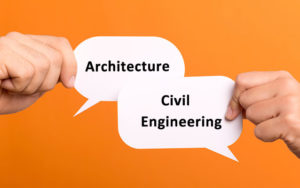Difference between Architecture & Civil Engineering Course & Scope
In the construction industry, development projects usually require the knowledge and understanding of both civil engineering and architecture. These are the important streams that require creating structures, such as buildings, airports, roads, residential complexes, bridges, tunnels etc.

Both professions have critical elements that are essential in any construction job and also they are dependent on one-another in order to complete a task.
These two professions are generally similar. Yet, there are clear differences between civil engineering and architecture.
Key Differences
The nature of civil engineering is more computational and is related to designing & analysis of structure, as well as its construction and maintenance w.r.t. to agreed / approved designs.
On the other hand, the nature of architecture is more artistic and towards the utilization of space / area keeping high aesthetic value.
Scope of Civil Engineering and Architecture
Career scope for civil engineers and architects is extremely high. Both the disciplines are together involved in many different types of projects. These projects may be like high rise buildings, tunnels, roads, bridges, canal systems, drainage works etc.
Role of civil engineers are concerned with
-
Surveys
-
Measurements
-
Structural designing
-
Procurement of construction materials
-
Manpower planning
-
Project execution
-
Site supervision
-
Structure maintenance
Civil engineers work under the posts of surveyor, quantity surveyor, estimator, billing engineer, structural designer, procurement manager, planning engineer, site engineer, quality engineer, etc.
Architects are responsible for
-
Planning
-
Drawing
-
Designing
-
Structural drawing
-
Utilization of space
-
Application of building bye-laws
-
Interior designing
-
Appearance management





